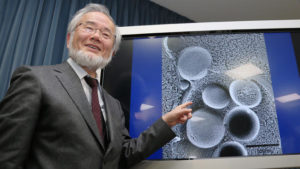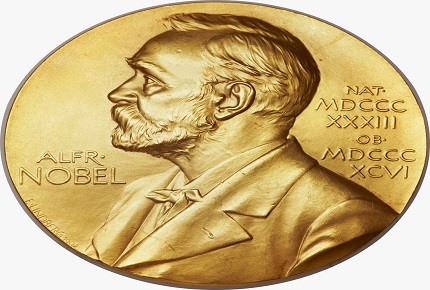The Nobel Prize in medicine has been awarded to a Japanese cell biologist Yoshinori Ohsumi, for discoveries on how cells break down and recycle their own components.
About Yoshinori Ohsumi :
Yoshinori Ohsumi is a Japanese cell biologist specializing in autophagy. Ohsumi is a professor in Tokyo Institute of Technology’s Frontier Research Center.
- He received the Kyoto Prize for Basic Science in 2012 and the 2016 Nobel Prize in Physiology or Medicine for his discoveries of mechanisms for autophagy.
- Ohsumi was born on February 9, 1945 in Fukuoka, Japan. He received a B.Sci. in 1967 and a D.Sci. in 1974, both from the University of Tokyo. In 1974–77 he was a postdoctoral fellow at the Rockefeller University in New York City
- He returned to The University of Tokyo in 1977 as a research associate; he was appointed Lecturer there in 1986, and promoted to Associate Professor in 1988. In 1996 he moved to the National Institute for Basic Biology in Okazaki City, Japan.
- Where he was appointed as a professor. From 2004 to 2009 he was also professor at the Graduate University for Advanced Studies in Hayama, Japan.
- In 2009 he transitioned to a three-way appointment as anemeritus professor at the National Institute for Basic Biology and at the Graduate University for Advanced Studies, and a professorship at the Advanced Research Organization, Integrated Research Institute, Tokyo Institute of Technology.
- After his retirement in 2014, he continued to serve as Professor at Institute of Innovative Research, Tokyo Institute of Technology. Currently, he is head of the Cell Biology Research Unit, Institute of Innovative Research, Tokyo Institute of Technology

- In 2016 he was awarded the Nobel Prize in Physiology or Medicine for discovering the mechanisms for autophagy.
About his Discovery :
Yoshinori Ohsumi, a 71-year-old biologist at the Tokyo Institute of Technology, used baker’s yeast cells to shed light on a cellular process called autophagy (Greek for “self-eating”). In a series of experiments conducted at the University of Tokyo in the late 1980s, Ohsumi identified 15 genes that oversee cells’ elimination of damaged proteins and worn-out organelles by moving them into a specialized cellular compartment and breaking them down to provide the cell with nutrients.
- The process of waste-elimination and cellular renewal that Ohsumi elucidated works the same in human cells. It is an essential response to starvation and other types of cellular stress, including viral and bacterial invasion, and contributes to cell differentiation and embryo development.
- Autophagy is the body’s internal recycling programme – scrap cell components are captured and the useful parts are stripped out to generate energy or build new cells. The process is crucial for preventing cancerous growths, warding off infection and, by maintaining a healthy metabolism, it helps protect against conditions like diabetes.
- Dysfunctional autophagy has been linked to Parkinson’s disease, type 2 diabetes, cancer and a host of age-related disorders. Intense research is underway to develop drugs that can target autophagy to treat various diseases.
- The word autophagy originates from two Greek words meaning “self-eating”. It refers to the process in which cellular junk is captured and sealed in sack-like membranes, called autophagosomes. The sealed contents are transported to another structure called the lysosome, once considered little more than the cellular rubbish bin.
- Ohsumi’s findings were first published in 1992 in the Journal of Cell Biology. The Nobel Committee, a Nobel Assembly working body that recommends physiology/medicine laureates to the full panel, said Monday that Ohsumi’s “brilliant experiments” have opened the way to “intense research” aimed at developing disease treatments that target the process of autophagy.’





